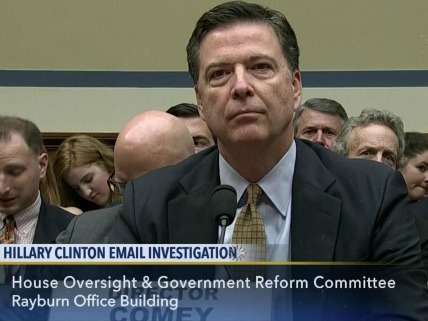FBI Head Says Prosecuting Hillary Clinton for 'Gross Negligence' Would Be Unfair
James Comey says justice demands proof of criminal intent, even when the law doesn't.

Yesterday FBI Director James Comey clarified his rationale for concluding that "no reasonable prosecutor" would bring a case against Hillary Clinton for the mishandling of classified material that resulted from her decision to use private email servers as secretary of state. Testifying before the House Oversight and Government Reform Committee, Comey acknowledged that a conviction under 18 USC 793, which makes it a felony to permit the removal of classified information "from its proper place of custody," does not require proof that the defendant knew he was breaking the law. It is enough to show he allowed removal of the information "through gross negligence," meaning that (as Comey put it) the government need only prove he was "really, really careless beyond a reasonable doubt." Comey said he understands why people were puzzled by his apparent neglect of that provision. "I get that folks see disconnections, especially when they see a statute that says 'gross negligence,'" he said. "'Well, the director just said she was extremely careless. So how is that not prosecutable?'"
The short answer: It is prosecutable, but Comey believes it should not be prosecuted because people should not be charged with a crime when they may not have realized they were breaking the law. "In our system of law, there's a thing called mens rea," he said. "We don't want to put people in jail unless we prove that they knew they were doing something they shouldn't do. That is the characteristic of all the prosecutions involving mishandling of classified information." He said he was able to locate just one case prosecuted under the "gross negligence" provision of 18 USC 793 in the century since the law was passed, which shows federal prosecutors "have grave concerns about whether it's appropriate to prosecute somebody for gross negligence."
Comey conceded that an FBI employee who used a private, unsecured email server to tansmit classified information would face serious consequences, possibly including dismissal and permanent loss of his security clearance. But he denied that he cut Clinton slack because of her political position. He said "the recommendation was made the way you would want it to be, by people who didn't give a hoot about politics, who cared about what are the facts, what is the law, and how similar people, all people, have been treated in the past." Comey therefore rejected the idea that Clinton benefited from a double standard. "You know what would be a double standard?" he said. "If she were prosecuted for gross negligence."
Because he believes prosecutions based on gross negligence are inappropriate, Comey said, he did not see his task as determining whether Clinton's "extremely careless…handling of very sensitive, highly classified information," as he described it on Tuesday, fit that standard. But he left little doubt that it did. "My term 'extremely careless' is trying to be kind of an ordinary person," he explained yesterday. "That's a common-sense way of describing it: It sure looks real careless to me….She should have known not to send classified information….That's the definition of negligent. I think she was extremely careless. I think she was negligent. That, I could establish. What we can't establish is that she acted with the necessary criminal intent."
According to Comey, proof of criminal intent is necessary not because the statute requires it but because justice does. "I see evidence of great carelessness, but I do not see evidence that is sufficient to establish that Secretary Clinton or those with whom she was corresponding both talked about classified information on e-mail and knew when they did it they were doing something that was against the law," he said. "The protection we have as Americans is that the government in general, and in that statute in particular, has to prove before [it] can prosecute any of us that we did this thing that's forbidden by the law, and when we did it, we knew we were doing something that was unlawful. We don't have to know the code number, but [the government must show] that we knew we were doing something that was unlawful. That's the protection we have, one I have worked for very hard. When I was in the private sector, I did a lot of work with the Chamber of Commerce to stop the criminalization of negligence in the United States."
It is heartening to hear the head of the FBI, who also has served as a U.S. attorney and deputy attorney general, defend this principle, especially at a time when his colleagues at the Justice Department are fighting mens rea reform on the grounds that it would make convictions harder to obtain. The principle is worth defending, even if it benefits Hillary Clinton.



Show Comments (125)